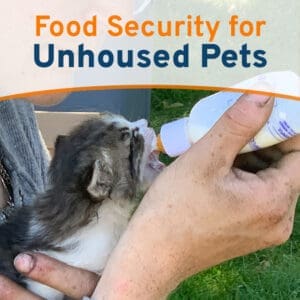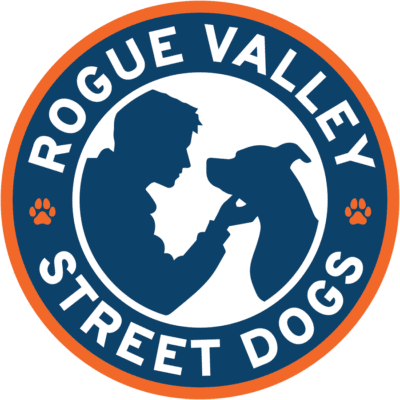 In the world of unhoused individuals, love, loyalty, and survival often converge in one deeply meaningful relationship: the one between a person and their pet. These bonds are powerful, rooted in mutual companionship and trust, and frequently provide emotional and even physical safety. Yet while love may be abundant, resources often are not — and one of the most stressful daily concerns for unhoused pet owners is how to keep their companions fed and healthy. Food security for unhoused pets is often a daily struggle for many of the community members we work with.
In the world of unhoused individuals, love, loyalty, and survival often converge in one deeply meaningful relationship: the one between a person and their pet. These bonds are powerful, rooted in mutual companionship and trust, and frequently provide emotional and even physical safety. Yet while love may be abundant, resources often are not — and one of the most stressful daily concerns for unhoused pet owners is how to keep their companions fed and healthy. Food security for unhoused pets is often a daily struggle for many of the community members we work with.
At Rogue Valley Street Dogs, we’ve seen the devotion firsthand. Many of the people we serve will go hungry themselves before allowing their dog or cat to skip a meal. But even the deepest dedication can’t replace access to balanced nutrition and safe, consistent meals.
The Realities of Feeding Pets While Unhoused
For individuals without stable housing, every day involves navigating a complex set of survival tasks — and feeding a pet adds another layer of challenge. Simple things many of us take for granted, like having a pantry or refrigerator to store food in, are often out of reach for unhoused individuals. There’s no income to purchase bags of kibble. And even when food is available, it may not be the right type for the animal’s age, size, or health condition.
Instead, meals are often improvised: scraps from fast food, shared portions of human meals, expired donations, or whatever someone is able to carry from one place to another. While well-intentioned, these feeding methods can lead to serious nutritional deficiencies, long-term health problems, or even food-related illnesses in pets.
The Essential Nutrients Every Pet Needs
Dogs and cats require specific nutrients to maintain healthy energy levels, organ function, skin, and immune systems. Without proper balance, pets can develop health problems that are difficult (or impossible) to treat on the streets.
1. Protein
Protein is critical for both dogs and cats. It provides amino acids that support muscle development, tissue repair, hormone production, and immune response. Dogs can utilize both animal and plant proteins, but animal-based proteins (like chicken, beef, or fish) are the most complete and digestible.
Cats, being obligate carnivores, must have high levels of animal-based protein in their diet. Inadequate protein intake can result in muscle wasting, poor coat health, lethargy, and a weakened immune system.
2. Fats and Fatty Acids
Fats provide essential energy and help the body absorb fat-soluble vitamins (A, D, E, and K). Omega-3 and omega-6 fatty acids also support skin and coat health and reduce inflammation. Pet foods with quality animal fats or fish oils are ideal, but these are rarely found in leftover human food.
3. Carbohydrates
While not essential for survival in cats, carbohydrates provide energy and fiber, especially for dogs. Too many carbs, however, especially from processed human foods like bread or pasta, can lead to obesity or poor digestion in pets. The key is quality, digestible carbs like rice, oats, or sweet potatoes — rarely accessible to someone living on the streets.
4. Vitamins and Minerals
Pets need a wide range of vitamins and minerals to support bone health, red blood cell production, nerve function, and enzyme activity. For example:
- Calcium and phosphorus are crucial for bone development.
- Zinc supports skin and coat health.
- Vitamin A supports vision and immune function.
- Taurine, an amino acid required by cats, supports heart and eye health — but is not found in plant-based proteins or many human foods.
Deficiencies in any of these nutrients can lead to long-term health issues, including brittle bones, poor healing, skin disorders, neurological symptoms, and heart problems.
The Dangers of Feeding Pets Human Food
When people give their pets human food, it’s out of necessity — never neglect. Unfortunately, many common human foods are toxic to pets or, at the very least, nutritionally inappropriate.
Toxic foods include:
- Onions and garlic: Can cause anemia in both dogs and cats.
- Chocolate, grapes, raisins: Toxic to dogs and potentially fatal.
- Xylitol (a sweetener): Found in gum and some processed foods, it causes rapid insulin release and liver failure in dogs.
- Cooked bones: Can splinter and cause choking or gastrointestinal injuries.
Additionally, fatty foods (like leftover burgers or pizza) can cause pancreatitis, especially in dogs. While these foods may seem like a treat, they can trigger vomiting, diarrhea, and severe abdominal pain — difficult to treat without veterinary access.
Rogue Valley Street Dogs Supports Food Security for Unhoused Pets
Understanding the depth of this issue, Rogue Valley Street Dogs helps support food security for unhoused pets when we are able to secure supplies. At our outreach events, we try to provide:
- High-quality kibble and canned food for both dogs and cats.
- Portion-sized meal packs that can be easily carried or stored without refrigeration.
- Treats and chews to promote dental health and reward bonding.
- Bowls, scoops, and portable water dishes to encourage safe feeding practices.
We also work to educate pet owners about portion sizes, ingredient labels, and safe alternatives when pet food isn’t available. If someone needs a specialty diet — for example, puppy food, senior formulas, or low-allergen blends — we do our best to supply those as well.
By taking this burden off pet owners’ shoulders, we reduce stress and improve outcomes for both the animal and the human. We’ve seen people cry with relief just to receive a small bag of kibble, knowing their beloved companion will eat well that night.
When a person knows their pet will eat that day — and the next — something incredible happens. Their anxiety drops. Their ability to focus on finding housing or medical care improves. And their bond with their pet strengthens. In other words, pet food security contributes to human stability.
In many ways, feeding a pet consistently is the first step in building trust and empowering people to seek help for themselves. That’s why Rogue Valley Street Dogs doesn’t just hand out kibble — we provide dignity, reassurance, and hope.
How You Can Help
The need to support food security for unshoused pets is growing. As housing instability continues to rise, so does the number of pets living in tents, vehicles, or transitional shelters. And as more people turn to Rogue Valley Street Dogs for help, we need the community’s support.
You can help by:
- Donating pet food (especially high-quality kibble and canned food).
- Purchasing pet food and supplies from our Amazon wish list. By choosing this option, you’ll help us obtain the food most needed in our community.
- Making a financial donation so we can purchase specialty diets and supplies.
- Volunteering at outreach events.
Pet food security may seem like a small issue in the scope of homelessness — but for those living it, it’s everything. It’s a symbol of love, commitment, and the desire to do right by a loyal companion despite unimaginable circumstances.
At Rogue Valley Street Dogs, we believe that every pet deserves a full belly, and every person deserves the peace of knowing they’ve provided that. Together, we can make that happen — one bowl at a time.

Reader Interactions